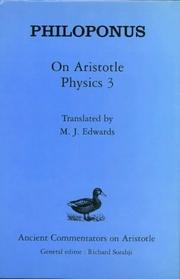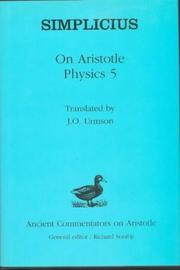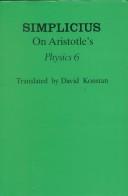| Listing 1 - 8 of 8 |
Sort by
|

ISBN: 9780715626160 0715626167 Year: 1994 Publisher: London : Duckworth,
Abstract | Keywords | Export | Availability | Bookmark
 Loading...
Loading...Choose an application
- Reference Manager
- EndNote
- RefWorks (Direct export to RefWorks)
Aristote, --- Physica (Aristoteles). --- Aristoteles, --- Physics --- Physique --- Early works to 1800 --- Ouvrages avant 1800 --- Aristotle. --- Aristote --- Physics - Early works to 1800

ISBN: 9780715627655 0715627651 1472558464 9781472558466 Year: 2014 Publisher: London : Bloomsbury,
Abstract | Keywords | Export | Availability | Bookmark
 Loading...
Loading...Choose an application
- Reference Manager
- EndNote
- RefWorks (Direct export to RefWorks)
Simplicius, the greatest surviving ancient authority on Aristotle's Physics, lived in the sixth century A.D. He produced detailed commentaries on several of Aristotle's works. Those on the Physics, which alone come to over 1,300 pages in the original Greek, preserve a centuries-old tradition of ancient scholarship on Aristotle. In Physics Book 5 Aristotle lays down some of the principles of his dynamics and theory of change. What does not count as a change: change of relation? the flux of time? There is no change of change, yet acceleration is recognised. Aristotle defines 'continuous', 'contact', and 'next', and uses these definitions in discussing when we can claim that the same change or event is still going on. Simplicius, the greatest surviving ancient authority on Aristotle's Physics, lived in the sixth century A.D. He produced detailed commentaries on several of Aristotle's works. Those on the Physics, which alone come to over 1,300 pages in the original Greek, preserve a centuries-old tradition of ancient scholarship on Aristotle. In Physics Book 5 Aristotle lays down some of the principles of his dynamics and theory of change. What does not count as a change: change of relation? the flux of time? There is no change of change, yet acceleration is recognised. Aristotle defines 'continuous', 'contact', and 'next', and uses these definitions in discussing when we can claim that the same change or event is still going on. This volume is complemented by David Konstan's translation of Simplicius' commentary on Physics Book 6, which has already appeared in this series. It is Book 6 that gives spatial application to the terms defined in Book 5, and uses them to mount a celebrated attack on atomism. Simplicius' commentaries enrich our understanding of the Physics and of its interpretation in the ancient world.
Aristote, --- Aristotle. Physics. Book 5. --- Change -- Early works to 1800. --- Science, Ancient Continuity -- Early works to 1800. --- Physics --- Science, Ancient. --- Aristotle. --- Physica (Aristoteles). --- Aristoteles, --- Aristote
Book
ISBN: 9783465034308 Year: 2005 Publisher: Frankfurt am Main : Klostermann,
Abstract | Keywords | Export | Availability | Bookmark
 Loading...
Loading...Choose an application
- Reference Manager
- EndNote
- RefWorks (Direct export to RefWorks)
Logica. --- Metaphysica (Aristoteles). --- Ontologie (filosofie). --- Ontologie. --- Ontology. --- Phenomenology. --- Philosophie. --- Philosophy. --- Physica (Aristoteles). --- Phénoménologie. --- ontologies (vocabularies). --- ontology (metaphysics). --- phenomenology. --- philosophy. --- Aristote. --- Aristotle.

ISBN: 9780715622179 071562217X 9781780933658 0801422388 9780801422386 Year: 1989 Publisher: London Duckworth
Abstract | Keywords | Export | Availability | Bookmark
 Loading...
Loading...Choose an application
- Reference Manager
- EndNote
- RefWorks (Direct export to RefWorks)
Aristote, --- Physics --- Science, Ancient. --- Aristotle. --- Atomisme. --- Continuity --- Continuity. --- Motion. --- Mouvement (Philosophie). --- Physica (Aristoteles). --- Physics. --- Science. --- Aristote. --- Physics (Aristotle). --- Philosophy of nature --- Aristotle --- Science, Ancient --- Ancient science --- Science, Primitive --- Science --- Continuum --- Mathematics --- Indivisibles (Philosophy) --- Early works to 1800 --- History --- Philosophy --- Early works to 1800. --- Aristote --- Continuity - Early works to 1800. --- Physics - Early works to 1800.
Book

ISBN: 9780715639214 9781472557926 1472557921 0715639218 1780932103 9781472557865 9781780932101 9780715638576 1472539176 1472557352 9780715627327 1472557867 0715638572 0715630679 9781472539175 1780938640 9780715630679 9781780938646 9781472557353 0715627325 Year: 2012 Publisher: London Bloomsbury
Abstract | Keywords | Export | Availability | Bookmark
 Loading...
Loading...Choose an application
- Reference Manager
- EndNote
- RefWorks (Direct export to RefWorks)
In this volume Simplicius deals with Aristotle's account of the Presocratics, and for many of them he is our chief or even sole authority. He quotes at length from Melissus, Parmenides and Zeno, sometimes from their original works but also from later writers from Plato onwards, drawing particularly on Alexander's lost commentary on Aristotle's Physics and on Porphyry . Much of his approach is just scholarly, but in places he reveals his Neoplatonist affiliation and attempts to show the basic agreement among his predecessors in spite of their apparent differences. This volume, part of the grou.
Philosophy of nature --- Aristotle --- Book 1 Space and time --- Space and time --- Physics --- Aristotle. --- Aristotle. Physics. --- Early works to 1800. --- Philosophie antique --- Aristote, --- Philosophie antique. --- Aristote --- Physics (Aristotle) --- Nature --- Chance --- Science, Ancient --- Physica (Aristoteles). --- Aristoteles, --- Physics. --- Physics (Aristotle). --- Aristotle. Physics Space and time --- Aristote (0384-0322 av. J.-C.). --- Science, Ancient. --- Espace et temps --- Physique --- Ouvrages avant 1800 --- Philoponus, John,
Book
ISBN: 1487519168 9781487519162 9781487503963 1487503962 1487519176 Year: 2018 Publisher: Toronto Buffalo London
Abstract | Keywords | Export | Availability | Bookmark
 Loading...
Loading...Choose an application
- Reference Manager
- EndNote
- RefWorks (Direct export to RefWorks)
Although Aristotle's contribution to biology has long been recognized, there are many philosophers and historians of science who still hold that he was the great delayer of natural science, calling him the man who held up the Scientific Revolution by two thousand years. They argue that Aristotle never considered the nature of matter as such or the changes that perceptible objects undergo simply as physical objects; he only thought about the many different, specific natures found in perceptible objects. Aristotle's Science of Matter and Motion focuses on refuting this misconception, arguing that Aristotle actually offered a systematic account of matter, motion, and the basic causal powers found in all physical objects. Author Christopher Byrne sheds lights on Aristotle's account of matter, revealing how Aristotle maintained that all perceptible objects are ultimately made from physical matter of one kind or another, accounting for their basic common features. For Aristotle, then, matter matters a great deal.
Matter. --- Motion. --- Kinetics --- Dynamics --- Physics --- Kinematics --- Atoms --- Gravitation --- Substance (Philosophy) --- Aristotle. --- Aristoteles. --- Physics (Aristotle) --- Physica (Aristoteles) --- Physica (Aristotle) --- Aristotle's Physics (Aristotle) --- De auditione physica (Aristotle) --- De natura aut de rerum principiis (Aristotle) --- De auditu physico (Aristotle) --- Physicae auscultationis libri VIII (Aristotle) --- Philosophia naturalis (Aristotle) --- De naturali auditu (Aristotle) --- Aristotelis Naturalis auscultationis librum VIII (Aristotle) --- Naturalis auscultationis librum VIII (Aristotle) --- Aristotelis physica (Aristotle)
Book
ISBN: 1472552016 1472501764 9781472501769 9781472552013 9781472500939 1472500938 9781780930916 1780930917 9781472539168 Year: 2014 Publisher: London : Bloomsbury,
Abstract | Keywords | Export | Availability | Bookmark
 Loading...
Loading...Choose an application
- Reference Manager
- EndNote
- RefWorks (Direct export to RefWorks)
"Philoponus has been identified as the founder in dynamics of the theory of impetus, an inner force impressed from without, which, in its later recurrence, has been hailed as a scientific revolution. His commentary is translated here without the previously translated excursus, the Corollary on Void, previously translated in the series. Philoponus rejects Aristotle's attack on the very idea of void and of the possibility of motion in it, even though he thinks that void never occurs in fact. Philoponus' arguement was later to be praised by Galileo."--Bloomsbury Publishing Philoponus has been identified as the founder in dynamics of the theory of impetus, an inner force impressed from without, which, in its later recurrence, has been hailed as a scientific revolution. His commentary is translated here without the previously translated excursus, the Corollary on Void, also available in this series. Philoponus rejects Aristotle's attack on the very idea of void and of the possibility of motion in it, even though he thinks that void never occurs in fact. Philoponus' argument was later to be praised by Galileo. This volume contains the first English translation of Philoponus' commentary, as well as a detailed introduction, extensive explanatory notes and a bibliography.
Physics --- Place (Philosophy) --- Science, Ancient. --- Ancient science --- Science, Primitive --- Science --- Philosophy --- History --- Aristotle. --- Space and time --- Space of more than three dimensions --- Space-time --- Space-time continuum --- Space-times --- Spacetime --- Time and space --- Fourth dimension --- Infinite --- Metaphysics --- Space sciences --- Time --- Beginning --- Hyperspace --- Relativity (Physics) --- Physique --- Early works to 1800 --- Philosophie --- Ouvrages avant 1800 --- Philosophy of nature --- Aristotle --- Philoponus, John, --- In Aristotelis Physicorum commentaria (Philoponus, John) --- Physics (Aristotle) --- In Physicorum III (Philoponus, John) --- Eis to 3. tēs Aristotelous Physikēs akroaseōs (Philoponus, John) --- Physica (Aristoteles) --- Physica (Aristotle) --- Aristotle's Physics (Aristotle) --- De auditione physica (Aristotle) --- De natura aut de rerum principiis (Aristotle) --- De auditu physico (Aristotle) --- Physicae auscultationis libri VIII (Aristotle) --- Philosophia naturalis (Aristotle) --- De naturali auditu (Aristotle) --- Aristotelis Naturalis auscultationis librum VIII (Aristotle) --- Naturalis auscultationis librum VIII (Aristotle) --- Aristotelis physica (Aristotle) --- Philosophie. --- Aristote
Book
ISBN: 1472552385 1472501799 9781472501790 1306723949 9781306723947 9781780932101 1780932103 9781472552389 9781472500960 1472500962 9781472539175 1472539176 0715630679 9780715638576 9780715630679 0715639218 0715638572 1472557867 9780715639214 9781780938646 0715627325 1472557352 1472557921 1780938640 9781472557926 9781472557353 9780715627327 9781472557865 Year: 2012 Publisher: London Bristol Classical Press
Abstract | Keywords | Export | Availability | Bookmark
 Loading...
Loading...Choose an application
- Reference Manager
- EndNote
- RefWorks (Direct export to RefWorks)
"In this commentary on Aristotle Physics book eight, chapters one to five, the sixth-century philosopher Simplicius quotes and explains important fragments of the Presocratic philosophers, provides the fragments of his Christian opponent Philoponus' Against Aristotle On the Eternity of the World, and makes extensive use of the lost commentary of Aristotle's leading defender, Alexander of Aphrodisias."--Bloomsbury Publishing In this commentary on Aristotle Physics book eight, chapters one to five, the sixth-century philosopher Simplicius quotes and explains important fragments of the Presocratic philosophers, provides the fragments of his Christian opponent Philoponus' Against Aristotle On the Eternity of the World, and makes extensive use of the lost commentary of Aristotle's leading defender, Alexander of Aphrodisias. This volume contains an English translation of Simplicius' important commentary, as well as a detailed introduction, explanatory notes and a bibliography.
Space and time --- Physics --- Space of more than three dimensions --- Space-time --- Space-time continuum --- Space-times --- Spacetime --- Time and space --- Fourth dimension --- Infinite --- Metaphysics --- Philosophy --- Space sciences --- Time --- Beginning --- Hyperspace --- Relativity (Physics) --- Aristotle. --- Aristoteles. --- Science, Ancient. --- Motion --- Early works to 1800. --- Kinetics --- Dynamics --- Kinematics --- Ancient science --- Science, Primitive --- Science --- History --- Espace et temps --- Physique --- Ouvrages avant 1800 --- Philoponus, John, --- Philosophie antique. --- Aristote, --- Philosophy of nature --- Aristotle --- Physics. --- Physics (Aristotle). --- Commentarii in octo Aristotelis Physicae auscultationis libros (Simplicius, of Cilicia) --- Physics (Aristotle) --- Physica (Aristoteles) --- Physica (Aristotle) --- Aristotle's Physics (Aristotle) --- De auditione physica (Aristotle) --- De natura aut de rerum principiis (Aristotle) --- De auditu physico (Aristotle) --- Physicae auscultationis libri VIII (Aristotle) --- Philosophia naturalis (Aristotle) --- De naturali auditu (Aristotle) --- Aristotelis Naturalis auscultationis librum VIII (Aristotle) --- Naturalis auscultationis librum VIII (Aristotle) --- Aristotelis physica (Aristotle) --- Hypomnēmata eis ta oktō Aristotelous Physikēs akroaseōs biblia (Simplicius, of Cilicia) --- Simplicii Commentarii in octo Aristotelis Physicae auscultationis libros (Simplicius, of Cilicia) --- Simplikiou Hypomnēmata eis ta oktō Aristotelous Physikēs akroaseōs biblia (Simplicius, of Cilicia) --- Aristote --- Nature --- Chance --- Science, Ancient --- Aristote (0384-0322 av. J.-C.).
| Listing 1 - 8 of 8 |
Sort by
|

 Search
Search Feedback
Feedback About
About Help
Help News
News